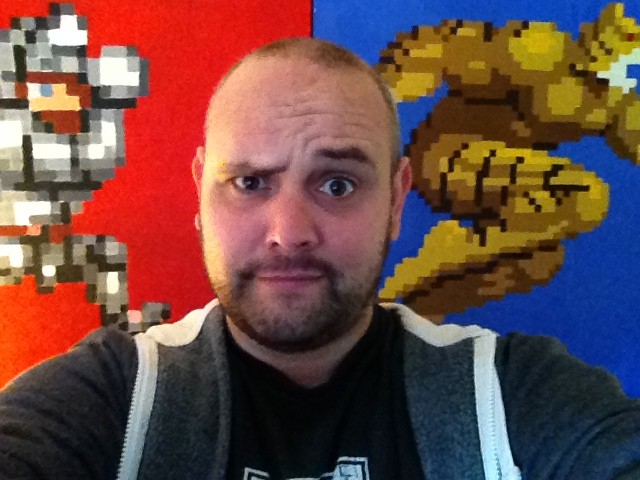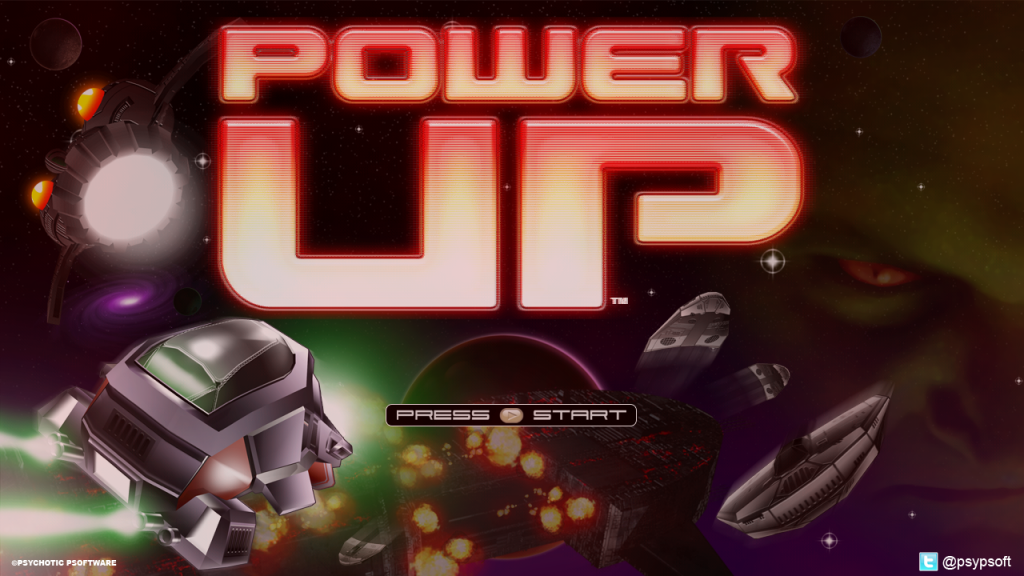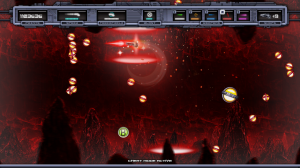Game:
Power Up
Developer:
Website:
Release Date :
2013
Platform:
XBLA (More platforms to follow)
Reviewed on Xbox
*UPDATE* Power Up has been submitted for the Steam Greenlight process! Below is a quick message from Mike himself and a link to the greenlight for Power Up. Show your support and if you like Power Up lets get it on Steam!
“Hi guys,
Mike here from Psychotic Psoftware, Power-Up, my one-man game for Xbox, has been submitted to the Steam Greenlight process and in less than a week, has already got itself over a quarter of the votes it needs to breach the top 100!
Not a bad start at all, but you know me. Not one to rest on my laurels, and I won’t relax until Power-Up is safely nestled into that top 100 and all but guaranteed a release in the next batch of indie games to hit the platform!
In a nutshell, I need your help! If you like Power-Up and would like to see it reach the PC platform in a meaningful way that could actually fund the creation of more of my little one-man games, I need you to hit that “yes” button!”
Click here to show Power Up your support! http://steamcommunity.com/sharedfiles/filedetails/?id=205427857
*UPDATE OVER*
After following Psychotic Psoftware on Twitter The Sound Architect have been very excited to review their new XBLA release “Power Up”. We discuss the sounds and music as well as speak to the game’s creator Mike Hanson.
Mike wanted to add a personal message about Psychotic Psoftware before the review:

“Hello. I’m Mike Hanson and I run Psychotic Psoftware… I say “run”. I actually mean that I AM Psychotic Psoftware. It’s a one-man game studio so I do everything from game design to art, music and code, not to mention interviews and press releases like this. I especially enjoy keeping in personal contact with the Twitter community that has supported me every step of the way.
I was educated in production for TV, film, etc and had a little computer games thrown in for good measure. It was during that education that I discovered Adobe Director (then, Macromedia Director) and I realised I might be able to combine my production skills with my art skills and code a decent looking/sounding Shockwave game.
My years writing songs in bands came in useful too, allowing me to work my own music into the mix.

For a few years, I made little Shockwave games, without success. I managed to find work as a games artist, mostly 2D, making GBA and mobile phone games. Soon I was using Shockwave to make demos of my own commercial games… again, without much success.
Continuing my work in the industry, my art underwent vast improvements… On top of this, I was eventually commissioned to produce the music for published games too. Meanwhile, my home programming was coming on in leaps and bounds.
Without expecting much I followed a couple of tutorials, replacing their art with my art, their sounds with my sounds, and eventually, their code with my code! By February 2012 I had the beginnings of a decent XNA game that was all my own. I decided to set up something of an online presence to test the water and find out if people were interested in another indie games company with a game in the works. Maybe I had something worth seeing…
I uploaded pictures of my progress on Facebook and Twitter, production videos on YouTube and even wrote a few blog posts about various aspects of the game and its production.
It’s a lot of work for a hobby, but until the end of last year I was progressing nicely, balancing Psychotic with my day job and family life, putting away the pennies to pay for my development software while putting two evenings a week into my first XNA game, Power Up.
I started 2013 unemployed having been made redundant from that day job as of Jan 1st, and had to accept that my savings needed to be immediately redirected into the cost of survival while I found a new job. That’s when I decided to approach the Kickstarter people. They were brilliant! They encouraged me to take my time setting up my campaign. When I considered it ready for submission, I went for it and a few nerve wracking days later it came back approved and ready to launch.
Thanks to my brilliant followers, my campaign was a success! You can see it here…
http://www.kickstarter.com/projects/2059856091/power-up-the-modern-retro-shmup-for-xbox?ref=email
Off the back of this success and the growing interest in my work as Psychotic Psoftware, I was recently approached by the industry site, Gamasutra (and their sister sites) with a view to featuring my production blog, Psychotic Pspeaks: an insight into indie game development.

At the time of writing, I’m priming Power Up for its Xbox release. In the months immediately following that I intend to port the game to PC and there are already iOS and Android versions outsourced and in the works, aiming for a 2014 release.
In a nutshell, I’m Mike. My one-man company is Psychotic Psoftware and my first game is Power Up! I’m learning and sharing as I go, so please stay in touch and follow me for the ride. Here’s the link to my website. This will basically get you to my Twitter, Facebook, YouTube and blog: www.psychoticpsoftware.com “

In Power Up you are the lone human survivor from an attack from the Lizard Race Armada. As the survivor you take control of the Weapon-F Prototype ship. The goal of each level is to destroy as many enemies and debris as possible utlizing the various weapons at your disposal. These weapons allow you to fire in different patterns and even include shooting up/down and behind you. The ultimate goal being to prevent the human races destruction! There are also many power-ups to pick up along the way ;).
I’m known for coining my phrases, especially in reviewing the audio for video-games. For Power Up I am coining the phrase “Pumping Retro”. The reason I use this term is right from the off the music makes me think “Action Movie!”. Straight away you’re thrown into this mess and you’re the only one who can do anything to save mankind. It certainly feels very “Get to the Chopper” as explosions cascade all around and the beat kicks in after you’re told to take as many of that scum as you can!

The music blends retro sounding synths reminiscent of “old school” mixed with that modern digital edge and edited drums. Even the intro music, as it describes how we are all doomed, has a heavy kick drum behind it supported by weird synths and percussive hits. I have to admit this very much reminded me of the Shinra & Turks music from FF7, just due to the drum beat and the sense of evil that it provides.

The SFX in Power Up is exactly what you would expect. It is again a mix of retro bloops and beeps reminiscent of side scrolling blasters such as Defender (see right) but modernised. The lasers and weapons themselves are exactly what I wanted. There’s only so many ways you can make a laser! So yes the lasers will sound how you expect a laser to sound. However, I don’t know about you but that’s what I want from a laser!
It’s hard to get across how much charm Power Up provides in writing. The sounds may not be ground-breakingly epic when compared to the tropes of CoD or Bioshock or whatever, but the fact that Power Up does intelligently implement the old school sounds with new school technology is what holds it appeal to me.
I will also admit that I was dubious with it being a one-man band production. I thought the sound, as usually happens, would have taken a back seat to the visuals and gameplay. I am happy to admit I was wrong, the sound has had as much focus as the rest of the game and I think Psychotic Psoftware has done a good job with the audio.
Basically if you love the old school sounds of those space shooters you used to play? Then you’re going to love this!
We asked Mike Hanson about the audio for Power Up:
What software did you use?
For sound and music it was Adobe Audition and Cubase. I chose my music production software for familliarity really. When I was at university back in 2001, studying Media Technology and production, we used a package called Cool Edit Pro. It was a really intuitive and powerful tool which came in useful for all kinds of things from editing Soundscape projects, to creating radio documentaries, dramas, sketches, etc. Hanging out in the student radio station with my mates, I got really familiar with its finer flourishes and recently I was really disappointed to find that Cool Edit Pro had actually been discontinued. Audacity, while free, was a little clunky and unpredictable for my liking and I was finding it difficult to get on with, so I was delighted to find that after a little further research, good old Adobe had lapped CEP up, updated it all a bit and re-packaged it as Adobe Audition… I gave it a whirl, and with a minimum of messing around, found myself back in business.
It went straight on my Kickstarter costs and I bought my own copy with the money. It was a similar story with Cubase, though this one had never really gone away. I have a certain group of very close, long term friends in my hometown of Liverpool. Since we were teenagers in the mid 90s, we’ve done this band thing on and off, whenever we’re all in the same place at the same time and able to find a bit of time to practice. Well, our most prolific time was after I graduated from university. I’d written rather a lot of songs and from 2001 to about 2004 we had a really good go of it, playing all the pubs and clubs that would have us in the Liverpool, Birkenhead, St Helens and Warrington areas. We were a bit of a brit-rock ensemble with big punky guitars, 3-part vocal harmonies and a hint of 90s indie, and we were constantly recording little EPs during that period. Cubase was the tool of choice at our practice rooms / recording studio and our engineer often let us get a bit hands on. Fast-forward nearly a decade, and when it came to making PowerUp’s music, I needed software I was at least vaguely familliar with so I could just crack on… Cubase was the one for me.
What plug-ins/vsts did you use?
To be honest, I didn’t really. Having mostly recorded everything live with my band, I’ve always had a bit of a garage-approach to things. To that end it was all samples to begin with. Starting with a base of drum samples I built up the rhythms for the game’s music, then using a combination of generated sine notes and orchestral instrument samples, I created bass instruments. I bought a cheap set of orchestra and coral samples, you know, just people playing and singing notes, which I then built up into the main body of my music and finally, I topped it all off with various bits of high end sine-based, heavily post-produced twinkles and bloops… not to mention a soupçon of distorted guitar here and there, courtesy of my now antiquated Tokai Loverock guitar and my clapped out old Marshall amp.
It actually wasn’t until right at the end of PowerUp that I learned anything about VST instruments. I needed a piano for the final piece of ending music and was again, considering buying a set of samples. However, by now, I was out of work and money was getting tight. I couldn’t really justify it so instead, I resolved to take a look into this VST instrument lark and after some fiddling around with Cubase’s finer functions, was impressed with the built in VST instrument selection… especially the pianos. A few years back I did a bit of work in MIDI when I was designing little games for early colour mobile devices, so it didn’t take long for me to figure out the VST timeline interface.
There’s only one track in PowerUp that uses VST sounds and it’s that final piece of piano music, though to hear it you’d have to complete the game on Medium difficulty or higher…. that or buy the soundtrack when I get it out there.
What were you trying to do with the music and SFX?
Well, I’ve done a few soundtracks in my time, and I generally find it’s best to have a think in advance about what you want to do, broadly, accross the whole thing. My more recent efforts include a futuristic jetpack game, with a main line of Theramine for a B-movie feel and a game I made the visuals for, entirely out of clay. With that one, I went for the 80’s deliberately-badly-synthesised keyboard-trumpet sort of thing while the melody was reminiscent of a non-aggressive Baby Elephant Walk motif.
With PowerUp, I knew I needed something really aggressive. Something intense, bordering on film score but then violently pulling the other way into a techno-edge with an undercurrent of sci-fi and technology. I wanted all the scale of Star Wars with all the banging fury of the Prodigy, and I wanted this hybrid within every track of the game.
Also, I wanted to draw on some of the emotional ties that I had to games of the 90’s so I had a good listen to some much loved retro game music before I got underway, especially of the 90s Amiga era. I wanted to give PowerUp the abillity to send players away with the same feelings that I personally harbour over the games of my childhood. While great visuals make a great means to entice, and solid, fair gameplay gives your game it’s sticking power, I do feel that music is a particularly potent tool for tickling those emotional receptors, especially when a player is thinking about your game in hindsight. I wanted my music to stay with the player long after play had ended.
Why did you decide to do the audio yourself?
I really love the whole process of making a game. I’m not much of a specialist. I wouldn’t be satisfied if I had to spend my entire existence as just a coder with no means of creating visuals or music. By the same token, as a professional games artist, I’ve found that I need the outlet of creating my own games; design, code and music and all. I truly love the games I grew up on and nothing gives me pleasure like being able to modernise those ideas through the creation of my own music, art, code, design, the works. I even edit all my own trailers, do all my own marketing, blog and record weekly update videos on the subject… in fact, back in February, I was doing all of the above while looking for my next day-job and running my own Kickstarter campaign!
In a world where people make their living specialising on one area of interest, I often find myself wondering how they cope. I suppose I just love the whole process. and creating sound and music is as much a part of the process and the rest of it. It also means that when it comes to giving the story, art style, and music style a sense of consistency, I only have to ask of, and answer to myself. There’s a big weight off in knowing that.
Leaving us pumped and ready to kill some Lizard Race scum, we very much look forward to playing more of Power Up! We leave you with the newest trailer to get you Powered Up:
Power Up is available NOW on the Xbox Store!


